Elizabeth II: The queen who wanted to be a horse
Equestrian sports have lost their monarch, who was a breeder of racing champions
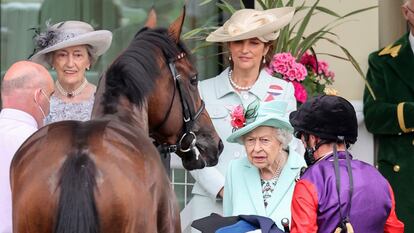
The horses have lost their queen. After the death of Elizabeth II, horse racing will no longer have the same glamour, and an old bond between the Windsors and their subjects is broken. Elizabeth II never said the words of Shakespeare’s Richard III —”my kingdom for a horse.” But when asked as a child what she wanted to be when she grew up, she did once say, “I would like to be a horse.”
Elizabeth II received daily press summaries from her secretaries. But she only read one newspaper, which accompanied each of her breakfasts from youth to death: the Racing Post, the bible of equine sports. As for books, she devoured treatises on horse genetics, pedigrees of equine champions and stories of illustrious stables, in addition to the odd romantic novel. And that was all.
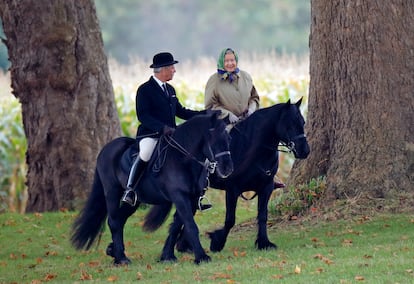
The family’s love of horses began with George V, the man who invented the Windsor name in the midst of World War I because the real family name (Saxe-Coburg und Gotha) sounded too German. George V also founded a royal stable of racehorses. And he chose the silks that the jockeys would wear: purple jacket, red sleeves, and a black cap with gold trim.
His second son, George VI, inherited the love of horses. George VI’s wife also loved racing, and she loved to gamble, which was illegal at the time. In 1943, at the height of World War II, a man named William Hill entered the scene. He had made his fortune with an illegal betting business on greyhound and horse races. Hill created a racing stable, where he met Elizabeth, the king’s wife.
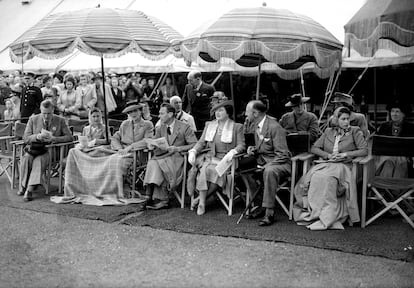
Over time, gambling became legal and William Hill became the largest company in the business. After Elizabeth was widowed, William Hill installed a telephone with a direct line to the headquarters in her private room, allowing the queen mother to bet discreetly under a fictitious name.
The future Elizabeth II was always passionate about horses. She rode her first pony at the age of four. After the death of her father, George VI, she not only succeded to the throne, but also inherited the royal stables. There she channeled all the passions that her job as queen forced her to hide. She did not care about the hobby’s exorbitant cost: stallions have been sold for up to €70 million, and the ejaculate of a champion stud can cost up to €250,000.
“Raising racehorses is like putting a faucet in your pocket,” Elizabeth II once said. She was not short on money, but she was clever. Thanks to the sale of her horses and the rental of her studs for breeding, she made a profit. It is estimated that over 70 years she made almost €9 million.
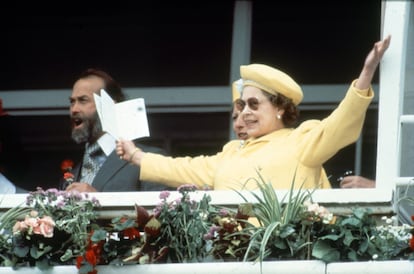
She also accumulated a brilliant racing record. Over 70 years, her horses participated in 3,441 races and won 566 times. 2021 was her best year: 36 wins and £550,000 (more than €600,000) in prize money.
The queen’s first racing adviser was the seventh Earl of Carnarvon, grandson of the discoverer of the tomb of Pharaoh Tutankhamun together with Howard Carter. He was succeeded by his son-in-law John Warren. Warren was one of the few people to be on a first-name basis with the queen.
Today, the offices of William Hill, and those of other betting parlors, are cold and empty. Almost all business is done online. On Saturday those premises were deserted. The only race of the day, in Doncaster, Yorkshire, had been suspended due to the royal death. But for decades those smoky, boozy joints united the working class and the royal family, whose queen mother was a high roller, in a peculiar rite. When the “gee-gees” were gambled on (the term comes from “giddy up”), it was not uncommon to place a bet on the queen’s horse, either with significant amounts or with a symbolic pound, as a form of tribute.
Breeding racehorses is very expensive. Many billionaires took on the hobby because it meant rubbing elbows with Elizabeth II at the racetracks, in her moments of greatest relaxation, when she allowed herself to shout and raise her fist. That incentive has ended for American moguls and the Arab sheiks. Neither Charles III nor his children have inherited the taste for the crossing of stallions and mares. Princess Anne, a great rider, is also unenthusiastic about the equine reproductive cycle.
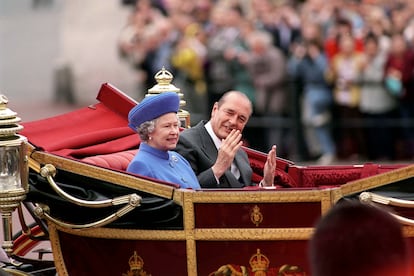
The late queen’s favorite pastime is the subject of a horse anecdote of doubtful provenance. Paul Burrell, the queen’s former butler, attributed the incident to the Sultan of Bahrain. But former French President Jacques Chirac, a man known for harsh jokes, claimed that he was the one who starred in it. He loved telling the story. Elizabeth II did not like Chirac: on the terrible night of August 31, 1997, when Diana of Wales died in a car accident in Paris, it was difficult to locate the French president because he was in bed with Claudia Cardinale. It seems permissible to attribute the story to him.
The queen and Chirac were on their way to Buckingham in the royal carriage when one of the horses let out a loud fart.
Elizabeth II, after all, owner of the horses, felt compelled to say something. “I’m sorry,” she murmured. Chirac was quick to reply: “Oh, don’t worry. I thought it was the horse.” There was a deadly silence inside the carriage.
Tu suscripción se está usando en otro dispositivo
¿Quieres añadir otro usuario a tu suscripción?
Si continúas leyendo en este dispositivo, no se podrá leer en el otro.
FlechaTu suscripción se está usando en otro dispositivo y solo puedes acceder a EL PAÍS desde un dispositivo a la vez.
Si quieres compartir tu cuenta, cambia tu suscripción a la modalidad Premium, así podrás añadir otro usuario. Cada uno accederá con su propia cuenta de email, lo que os permitirá personalizar vuestra experiencia en EL PAÍS.
¿Tienes una suscripción de empresa? Accede aquí para contratar más cuentas.
En el caso de no saber quién está usando tu cuenta, te recomendamos cambiar tu contraseña aquí.
Si decides continuar compartiendo tu cuenta, este mensaje se mostrará en tu dispositivo y en el de la otra persona que está usando tu cuenta de forma indefinida, afectando a tu experiencia de lectura. Puedes consultar aquí los términos y condiciones de la suscripción digital.









































